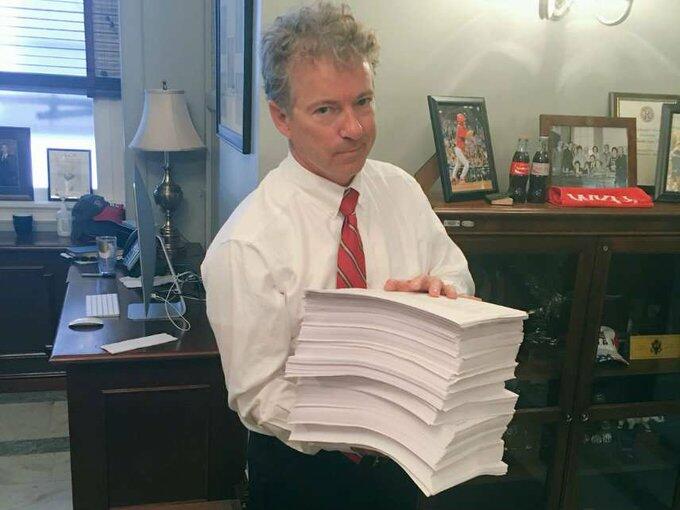Update (1335ET): Now things are getting interesting – as House Speaker Mike Johnson (R-LA) is reportedly discussing a ‘plan B’ to fund the government as a ‘clean’ Continuing Resolution (CR) without $100 billion disaster aid and the below shitshow of swampy handouts and government overreach, Politico reports.
Democrats will of course throw a mega-tantrum, which makes Friday’s government shutdown more likely – though as you can see (as of this writing), the odds are currently at 26%.
Update (1308ET): The new spending package isn’t just riddled with pork as detailed below, it’s packed full of weaponized pork.
For starters, it gives the Global Engagement Center – the government’s censorship juggernaut, additional funding.
It also contains language that allows Congress to block subpoenas for House data – which could prevent an investigation into the Jan. 6 committee:
New Biolab funding?
Vivek and Elon weigh in
Vivek Ramaswamy, who will be in charge of the new Department of Government Efficiency (DOGE) along with Elon Musk, has analyzed the bill:
I wanted to read the full 1,500+ page bill & speak with key leaders before forming an opinion. Having done that, here’s my view: it’s full of excessive spending, special interest giveaways & pork barrel politics. If Congress wants to get serious about government efficiency, they should VOTE NO.
Keeping the government open until March 14 will cost ~$380BN by itself, but the true cost of this omnibus CR is far greater due to new spending. Renewing the Farm Bill for an extra year: ~$130BN. Disaster relief: $100BN. Stimulus for farmers: $10BN. The Francis Scott Key Bridge replacement: $8BN. The proposal adds at least 65 cents of new spending for every dollar of continued discretionary spending.
The legislation will end up hurting many of the people it purports to help. Debt-fueled spending sprees may “feel good” today, but it’s like showering cocaine on an addict: it’s not compassion, it’s cruelty. Farmers will see more land sold to foreign buyers when taxes inevitably rise to meet our obligations. Our children will be saddled with crippling debt. Interest payments will be the largest item in our national budget.
Congress has known about this deadline since they created it in late September. There’s no reason why this couldn’t have gone through the standard process, instead of being rushed to a vote right before Congressmen want to go home for the holidays. The urgency is 100% manufactured & designed to avoid serious public debate.
The bill could have easily been under 20 pages. Instead, there are dozens of unrelated policy items crammed into the 1,547 pages of this bill. There’s no legitimate reason for them to be voted on as a package deal by a lame-duck Congress. 72 pages worth of “Pandemic Preparedness and Response” policy; renewal of the much-criticized “Global Engagement Center,” a key player in the federal censorship state; 17 different pieces of Commerce legislation; paving the way for a new football stadium in D.C.; a pay raise for Congressmen & Senators and making them eligible for Federal Employee Health Benefits. It’s indefensible to ram these measures through at the last second without debate.
We’re grateful for DOGE’s warm reception on Capitol Hill. Nearly everyone agrees we need a smaller & more streamlined federal government, but actions speak louder than words. This is an early test. The bill should fail.
* * *
Speaker Mike Johnson, (R-LA), has unveiled a 1,547-page government funding bill that has Republicans seeing red – and not just because of the looming Friday midnight shutdown deadline. Packed with disaster relief, farmer aid – oh, and they’re giving themselves a raise, the short-term spending bill is a hot mess of pork.
The bill, known as a continuing resolution (CR), keeps the federal government funded through March 14, buying Congress a little breathing room. But in classic Capitol Hill fashion, the measure is loaded with provisions unrelated to basic spending – and House conservatives are furious, according to Punchbowl News.
- $100 billion in disaster relief for hurricane-hit states.
- $30 billion in economic assistance for farmers.
- Restrictions on U.S. capital investment in China, a win for GOP hawks wary of Beijing’s influence.
- A delay in the implementation of a “beneficial ownership” database meant to curb money laundering until 2026.
- The transfer of RFK Stadium to the District of Columbia, clearing the way for a shiny new Washington Commanders stadium.
- The relocation of an Air National Guard fighter squadron from D.C. to Maryland.
- Even the American Music Tourism Act of 2024 got squeezed in
And what’s this?
They’ve also given themselves a pay raise through the resumption of the Cost of Living Adjustment (COLA):
Since 2009, Congress has blocked COLA for lawmakers by inserting language into annual spending bills. While other federal employees receive regular pay increases, members of Congress have deliberately frozen their own salaries for over a decade.
The new CR, however, quietly amends language in a prior bill that blocked the member COLA, effectively clearing the way for a pay raise. As Bloomberg Government’s Jack Fitzpatrick first reported, the provision appears on page 15 of the 1,547-page bill and doesn’t state the pay increase explicitly.
Currently, members of Congress earn $174,000 annually—a substantial sum compared to the average American salary, but one that lawmakers argue no longer reflects the cost of serving in office. If COLA adjustments had been in place, their 2024 salaries would reach $243,300, according to a Congressional Research Service (CRS) report.
GOP Hardliners Demand Concessions
Johnson’s problems began Tuesday, when he sounded out hardliners on the House Rules Committee – Reps. Chip Roy (TX), Thomas Massie (KY), and Ralph Norman (SC) – to gauge their support for the bill. Unsurprisingly, the trio demanded a price for their cooperation:
- Adherence to the 72-hour rule to review the bill before voting.
- Spending offsets to counter the new funding.
- Restrictions on selling off border wall materials.
Johnson hasn’t agreed to these conditions, leaving him with little choice but to bring the CR to the floor under suspension of the rules, which requires a two-thirds majority for passage. A floor vote is expected Thursday, giving the Senate barely 24 hours to clear the bill before the clock strikes midnight Friday.
Sen. Rand Paul (R-KY) said he had “hoped to see @SpeakerJohnson grow a spine,” but “this bill full of pork shows he is a weak, weak man.”
“It’s silly to pretend this is just a skinny CR,” one GOP staffer told Punchbowl News. “It’s a three-month spending bill with ornaments hanging all over it.”
Meanwhile, conservatives in the House Freedom Caucus (HFC) are fuming at the bill’s scope and the speaker’s handling of the process. And GOP moderates are frustrated by the party’s inability to settle on a clean solution. Johnson, for his part, has no easy out – having opted for neither a clean CR nor a comprehensive omnibus spending package, and instead delivering a stopgap bill stuffed with unrelated provisions. Some hardliners are already withholding public support for Johnson ahead of his January 3 re-election bid for speaker, signaling that his light-handed leadership style may be backfiring.
Even Elon Musk has weighed in, voicing his displeasure online.
To which he essentially shrugged his shoulders.
Johnson has also pissed off the Ways and Means Committee, chaired by Rep. Jason Smith (R-MO), over two trade programs: the African Growth and Opportunity Act (AGOA) and a program granting duty-free access to U.S. markets for Haitian apparel exports. While Smith was close to a deal to extend both programs for five years, Johnson allowed the Haiti trade program into the CR while leaving AGOA on the cutting-room floor.
With the shutdown deadline looming, Johnson has little time to spare. The House is expected to vote on the bill Thursday, but with opposition mounting from conservatives, passage under suspension of the rules is far from certain. If Johnson can’t corral enough votes, the federal government risks shutting down just as lawmakers prepare to leave town for the Christmas holiday.
For example, as X user @TexasLindsay_ notes:
The 1,547 page federal spending bill has so many outrageous things in it, it’s hard to know where to begin – but it without a doubt should NOT pass as-is. But a great example of why we need @doge more than ever to reel in the governments insane spending & redundancies.
Highlights:
1. $8 BILLION—For Emergency Relief for damage caused by a cargo ship to the Francis Scott Key Bridge in Baltimore, MD and 20 surrounding counties, including reconstruction of the bridge.
2. A section regarding our health agencies – has a lot of red flags – and appears to aim to limit what the new HHS Secretary (@RobertKennedyJr) can and cannot do:
“The Secretary may not revise the Vaccine Injury Table to include a vaccine for which the Centers for Disease Control &!Prevention has issued a recommendation for routine use in children or pregnant women until at least one application for such vaccine has been approved… Upon such revision of the Vaccine Injury Table, all vaccines in a vaccine category on the Vaccine Injury Table, including vaccines authorized under emergency use… shall be considered included in the Vaceine Injury Table and they also added “CLARIFICATION—Notwithstanding… an injury or death related to a vaceine administered at a time when the vaccine was a covered countermeasure subject to a declaration under section 319F-3(b) SHALL NOT BE ELIGIBLE FOR COMPENSATION under the Program.”
3. Drinking Water Infrastructure Risk & Resilience Budget simply struck through their previous budget amount and just doubled their budgets across the board and updated the year(s)—because why not just double it.
From the bill:
—in paragraph (4), by strike: “$5,000,000′ and inserting “$10,000,000′;
—in paragraph (5) strike “$10,000,000′ and insert “$20,000,000′;
—in paragraph (6)—strike “$25,000,000′ and insert “$50,000,000”; & strike “2020 and 2021” and inserting “2026 and 2027”.4. $3.5 BILLION— For Capital Improvement & Maintenance [p. 81]
5. $2.5 BILLION—For Nat’l Forest Maintenance, which designates $75,000,000 “for the construction or maintenance of shaded fuel breaks in the Pacific Regions” —a cool $75 mil for shady gas breaks.
6. The Department of Commerce added language that will make them exempt from the “Freedom of Information Act” [p. 269]
(A federally funded government agency—especially one overseeing Commerce should not be granted exemption from public transparency via FOIA. Unacceptable.)
7. $30.7 BILLION—Ag Research: Various research projects, including many viewed as low priority/redundant with a need for scrutiny to improve efficiency.
8. $1.5 BILLION—Economic Development Admin: criticized for funding projects with low economic return or favoritism. (Orwellian title FTW)


